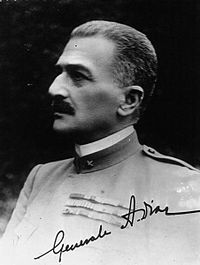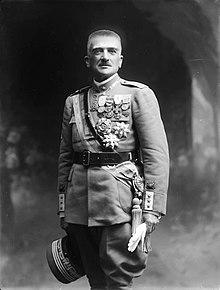Nothing has changed our modern world more than the insane start of the First World War in August 1914. It led directly to the Second World War, Communism, Fascism, Nazism, the Bomb, the Cold War, and some hot wars still to this day.
Historians all agree that the war was unnecessary and was caused by a cascading series of political blunders. While the dominos fell, the Kingdom of Italy watched the insanity sweeping Europe from France to Russia. It had a defensive alliance with both Austria and Germany at the time but the Teutons were definitely the aggressors that August. The Italians chose neutrality, as they would twenty-five years later under Mussolini when his ally Nazi Germany invaded Poland.
I recall an observation actor Peter Ustinov made many years ago on a late-night talk show: “Even in war, Italians are a rational people.” He was jokingly recounting how after the fall of Mussolini Italian partisans being bombarded in a trench by Germans yelled back at the enemy “Stop! There are people down here!”

Of course, Italy eventually entered both world wars. From 1915 to 1918, Italy lost some 650,000 soldiers in achieving victory over the Austrians, Hungarians, and Germans. It scored a battlefield victory two weeks before Armistice Day on the Western Front. The major results between the two fronts was that the German Army in France freely marched back to Germany; the Germans and Austrians in Italy marched into Italian prison camps. In fact, among the captured 350,000 Austro-Hungarian troops were 120,000 Germans, 83,000 Czechs and Slovaks, 60,000 South Slavs, 40,000 Poles, several tens of thousands of Romanians and Ukrainians. Italy’s victorious commander-in-chief was Neapolitan-born Gen. Armando Diaz who had relieved Gen. Luigi Cadorna, a northerner.
The triumph at Vittorio Veneto in 1918 was huge reversal of fortune from Italy’s defeat the year before at Caporetto. That disaster cost the Italians over a quarter million prisoners. The rout was partly stemmed with the summary execution of hundreds of retreating soldiers by Italy’s military police, the Carabinieri. This sad chapter made it to Hollywood’s 1932 version of A Farewell to Arms (Gary Cooper) but not to the 1957 version (Rock Hudson) which required actual Italian Army support during filming.

What subsequent histories have failed to report is the use of poison gas by the Germans at Caporetto. It would certainly explain the terror as hundreds of unprepared Italian soldiers were killed while stationed in otherwise bomb-proof mountain caves and earthworks. They died instantly from the penetrating gas, turning a retreat into a rout, a key factor in the collapse of the Italian Second Army. I have yet to find any Italian use of gas on that front.
We can only imagine what our world would be like if Europeans had sensibly avoided all-out war in 1914. The Edwardian Era as depicted in the movie Titanic with its social hierarchies and austere dress codes might have continued on for decades. Consider that it took the loose morals of two world wars to get us into speedos and bikinis!
Without the press of war, invention and innovation might have taken the slow road delaying perhaps for a century the amazing technology we enjoy today. But are we better for it?
Without the old European system destroying itself in 1914, colonies in Africa and Asia might have evolved differently. The European population wouldn’t be in a death spiral. Illegal migrations would be severely controlled, native populations better prepared economically, and hostile regions disarmed. Who is to say that the ‘developing’ world today is better off than what might have been?
Would ethnic strife and religious fanaticism be less of a torment in the world had Europeans developed a system of conflict resolution rather than militarization in 1914?
We are resigned to a world created by August 1914. Could it have been better? -JLM




At one point in my personal education, I started reading and studying about WWI, and all the unintended consequences….It was and still is mind boggling.. With US history really having a Western Front bias….all you really can easily find is information about trench warfare…on the Western Front.
Southern Europe, the Eastern front and the Middle East (of which conflict is still going on) is conveniently forgotten. That’s why at one point I had done a 100th anniversary exhibit with memorabilia from members of the Italian American Heritage Foundation in San Jose. You can get a totally different perspective including all the PR about the Christmas truces on the Western Front…..that also happened on the Italian lines too.
It should be noted that while Italy was an ally of the United States in WWI, when the war ended, the US Congress pass very restrictive immigration legislation (1922-24) that basically restricted migration to the US from Italy and Eastern Europe. So much for payback.
Likewise, regarding the horrors of WWI and gas warfare, it was a dark period in Italian history under Mussolini when they employed gas warfare in Ethiopia, in contempt of the League of Nation mandates. And recently again to see gas attacks resurface in the Middle East was chilling…. WWI was an insane set of dominos that was repeated with greater intensity, with WWII. Still, I hope humanity will never have to undergo this purge, yet again, with even more horrific consequences, given the level of armaments our brilliant minds have now created. It makes me want to dust off my assessment of “original sin”, our genetic pool, and our innate capacity and disposition towards violence as a way to solve a problem.
One quick note about the usage of gas in Ethiopia. Many accounts of such usage are exaggerations of Italian left-wing and British historians (including Denis Mack Smith). There have been recent unbiased researches and studies on Italian usage of gas. It has been determined that such usage was nothing if compared to the usage of other nations, including the U.K. British and French historians have always tried to make Italy look bad to cover their much bigger misdeeds and atrocities.
My father, born in a small city in Lazio, south of Rome, was one of those soldiers. Only 18-years old, he spent the rest of WWI as a prisoner-of-war in Austria. He wouldn’t speak about this until close to the end of his life.
The reason we did the program on recollections of the so called “Great” War, is all those memories are fast being lost , especially with the children’s generation. For example, it was one of the strangest situation all up and down the Italian trenches, there would be Christmas truces, and then return to the killing. This was commented on as a hand me down story by some of our members regarding their parents stories….another story was the lack of preparedness, by Italian troops, when it came to gas warfare. and contributed to the losses at Caporetto. There are very few village square in Italy that does not have a monument to the fallen in WWI
Interesting too Caporetto was always characterized as a great loss and folly, on the part of the Italian army, totally ignoring the madness on the western front where the English under Generals Haig and French literally destroyed a generation of British youth in their insane, suicidal offenses…..I think General Douglas Haig was Scotland’s revenge on the English….and the British military historians are still stuck with trying to justify his insane tactics that resulted in a suicidal slaughter of British youth. You can go on and on about those times, but it truly defies any sort of comprehension. If you wipe away the dust of history, you are still in shock at the insanity of the war……nothing great and glorious about it….for sure…